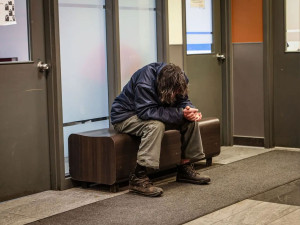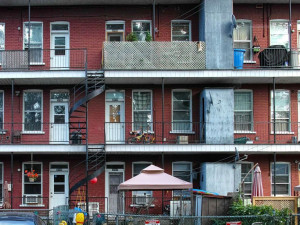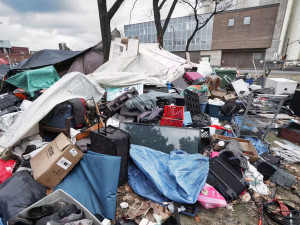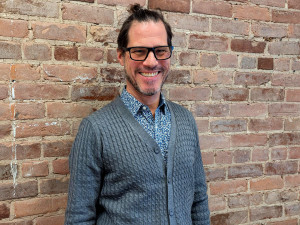
Rising homelessness is a direct reflection of the housing crisis

Photo: Marie-France Coallier archives Le Devoir
When the Legault government released its long-awaited housing strategy last week, the social and community housing community reacted strongly, and with good reason. While some of the announced measures show a commendable desire to respond to the housing crisis, they fail to address homelessness. The government’s main goal is to increase the overall supply of housing, including private-sector housing. There is no long-term vision for social and community housing. The strategy therefore neglects a critical dimension of the issue: affordability.
The government’s strategy for alleviating the housing shortage focuses on speeding up home construction. It wants to expand the use of prefab homes, rapidly increase the availability of labour and relax environmental, urban planning and heritage protection regulations. This could indeed result in more homes being built in less time. But a strategy that revolves around quantity and speed also raises concerns. For example, the use of prefabricated buildings will present challenges for projects in Montreal’s central districts, where a number of projects for people in vulnerable situations are planned. Fewer regulations could lead to a levelling down of urban development and architecture in Quebec. It will be important to proceed with caution and adapt these solutions to urban realities and the needs of vulnerable populations.
Some of the new measures in the housing strategy are commendable. For example, the conversion of heritage buildings into housing could open up new opportunities, provided these projects are truly accessible for low-income people. Similarly, the new budget for soil decontamination ticks off a prerequisite for the redevelopment of urban sites.
The current housing crisis and the homelessness crisis are closely connected. More and more people are finding themselves on the street for financial reasons, unable to cope with escalating rent increases, or because of the growing number of evictions in Quebec, particularly in the Greater Montreal area.
Despite this cause-effect relationship, homelessness is surprisingly absent from the government’s housing strategy. Instead, it has been relegated to the 2021-2026 interministerial action plan on homelessness. While the housing strategy does mention some initiatives related to affordability—for example, 500 units will be set aside under the Quebec Affordable Housing Program (known by its French acronym PHAQ) and municipalities will be encouraged to exempt buildings from property taxes or sell them below market value for transitional housing or accommodation—these measures, positive as they are, will make only a small dent in the spiralling crisis.
A response commensurate with the need
We welcome the government's desire to build more housing and address the current crisis but its strategy has severe limitations.
It bears repeating that the current situation is above all a crisis of affordability, not just a matter of supply. To tackle it, the government needs to set a clear target of 20% off-market housing and increase support for social and community projects.
At the Old Brewery Mission, we are eager to be part of the solution. Our target is to double the stock of housing we own to 500 by 2028. Meanwhile, the government's target remains 500 housing units dedicated to homelessness for all of Quebec...
According to the latest statistics, from 2022,1 nearly 5,000 people are sleeping on the streets or in emergency shelters every night in Montreal alone. We're counting on the government to move quickly to release the necessary funds and speed up the processes that will make it possible to get new projects underway.
It is clear that the housing challenge can be met only with a comprehensive, inclusive, long-term approach. Let's hope that the government’s new housing strategy, though imperfect, will be a first step towards solutions better suited to the needs of all communities, especially the most vulnerable.
Dernières nouvelles
-
 James Hughes, President and CEO of the Old Brewery Mission, receives the National Assembly Medal of Honour
James Hughes, President and CEO of the Old Brewery Mission, receives the National Assembly Medal of Honour -
 Meet Mariane Dupuis, psychosocial counsellor for the PRISM program
Meet Mariane Dupuis, psychosocial counsellor for the PRISM program -
 Will a 5.9% rent hike lead to more economic homelessness?
Will a 5.9% rent hike lead to more economic homelessness? -
 Homelessness in Montreal: Dismantling encampments isn’t the solution
Homelessness in Montreal: Dismantling encampments isn’t the solution -
 Meet Desmond Olsthoorn, Director of Emergency and Proximity Services
Meet Desmond Olsthoorn, Director of Emergency and Proximity Services - See all news